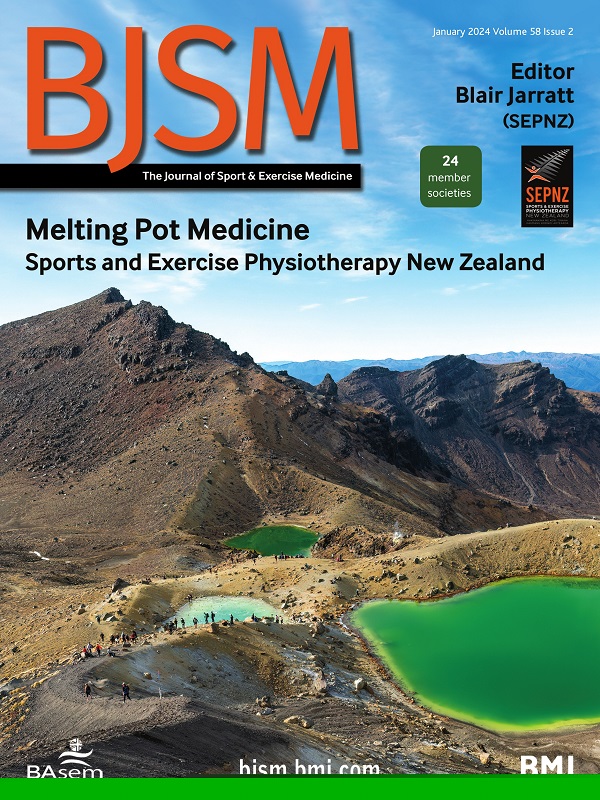Psychosocial aspects of sports injuries are on the agenda: but what can be measured and assessed during rehabilitation and return to sport?
IF 16.2
1区 医学
Q1 SPORT SCIENCES
引用次数: 0
Abstract
The impact and consequences of sports-related injuries involve a complex interplay between biological, psychological and social factors. Psychological factors are important because anxiety, fear of reinjury, kinesiophobia, optimism, self-motivation and perceived social support are linked with sports injury rehabilitation and return-to-sport outcomes.1–3 Wiese-Bjornstal et al. 4 proposed an integrated model to illustrate how psychosocial reactions among injured athletes are comprised of cognitive components (ie, a sense of loss, pressure, stress, pain, optimism and pessimism), affective components (ie, fear of movement and reinjury, anxiety, anger and frustration) and behavioural components (ie, risky behaviour, social connection and coping). While this model has gained recognition worldwide, more specific suggestions on how these psychosocial factors can be measured and assessed are lacking.3 4 The aim of this editorial is to review our existing tools for the measurement and evaluation of psychological factors during the sports injury rehabilitation and return-to-sport process. High-quality psychological care is important to all injured athletes, and measuring psychosocial factors can provide valuable insights and help monitor their ‘injury experience’. This is, however, often overlooked in standard clinical evaluations, which tend to focus primarily on tissue damage and physical function. Psychosocial measurement instruments assessing psychosocial aspects should provide valuable context-specific insights into an athlete’s psychosocial state and well-being. …运动损伤的社会心理方面已提上议程:但在康复和重返运动期间可以测量和评估什么?
运动相关损伤的影响和后果涉及生物、心理和社会因素之间复杂的相互作用。心理因素很重要,因为焦虑、对再次受伤的恐惧、运动恐惧症、乐观、自我激励和感知到的社会支持与运动损伤康复和重返运动结果有关。1-3 Wiese-Bjornstal等人提出了一个综合模型来说明受伤运动员的社会心理反应是如何由认知成分(即失失感、压力、紧张、疼痛、乐观和悲观)、情感成分(即对运动和再受伤的恐惧、焦虑、愤怒和沮丧)和行为成分(即冒险行为、社会联系和应对)组成的。虽然这一模式在世界范围内得到了认可,但关于如何测量和评估这些社会心理因素的更具体建议还缺乏。这篇社论的目的是回顾我们现有的测量和评估运动损伤康复和恢复运动过程中心理因素的工具。高质量的心理护理对所有受伤的运动员都很重要,测量心理社会因素可以提供有价值的见解,并帮助监测他们的“受伤经历”。然而,这在标准的临床评估中往往被忽视,这些评估往往主要关注组织损伤和身体功能。评估心理社会方面的心理社会测量仪器应该为运动员的心理社会状态和福祉提供有价值的具体情况的见解。...
本文章由计算机程序翻译,如有差异,请以英文原文为准。
求助全文
约1分钟内获得全文
求助全文
来源期刊
CiteScore
27.10
自引率
4.90%
发文量
217
审稿时长
3-8 weeks
期刊介绍:
The British Journal of Sports Medicine (BJSM) is a dynamic platform that presents groundbreaking research, thought-provoking reviews, and meaningful discussions on sport and exercise medicine. Our focus encompasses various clinically-relevant aspects such as physiotherapy, physical therapy, and rehabilitation. With an aim to foster innovation, education, and knowledge translation, we strive to bridge the gap between research and practical implementation in the field. Our multi-media approach, including web, print, video, and audio resources, along with our active presence on social media, connects a global community of healthcare professionals dedicated to treating active individuals.

 求助内容:
求助内容: 应助结果提醒方式:
应助结果提醒方式:


